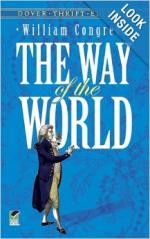
|
| Name: _________________________ | Period: ___________________ |
This test consists of 5 multiple choice questions, 5 short answer questions, and 10 short essay questions.
Multiple Choice Questions
1. What is Lady Wishfort's reaction to the revelations of Mirabell and Mrs. Fainall?
(a) She thanks her daughter for her deviousness.
(b) She is upset.
(c) She is grateful to her daughter.
(d) She praises Mrs. Fainall's prudence.
2. Why does Mrs. Millamant leave the room after the arrival of Witwoud and Petulant?
(a) She dislikes them.
(b) She needs to get dressed for dinner.
(c) She becomes frustrated with Witwoud and Petulant.
(d) She believes that Mirabell is coming.
3. What does Mirabell do to Fainall at the end of the play?
(a) Tells Fainall that he is a liar and a cheat.
(b) Asks him to a duel.
(c) Exposes his affair with Mrs. Marwood.
(d) Suggests Fainall leave with Mrs. Marwood.
4. Why does Lady Wishfort claim she cannot turn over her fortune to Fainall?
(a) Because she doesn't like being blackmailed.
(b) Because of her legal counsel.
(c) Because she has no fortune.
(d) Because Mrs. Millamant has agreed to marry Sir Wilfull.
5. What problem must Lady Wishfort solve instead of attending Sir Rowland at the end of Act 4, Scene 1?
(a) Petulant's lady friends who are outside the house.
(b) The drunkenness of her other male guests.
(c) Mirabell's argument with Mrs. Millamant.
(d) Problems between Mrs. Fainall and her husband.
Short Answer Questions
1. What is Lady Wishfort's reaction to Mrs. Marwood's suggestion about Mrs. Fainall?
2. What purpose does the interaction between Sir Rowland and Lady Wishfort serve as they discuss marriage?
3. What does Waitwell bring into the room in the last scene?
4. What does Mrs. Millamant achieve when she renounces Mirabell?
5. What does the item that Waitwell brings into the room in the last scene contain?
Short Essay Questions
1. As Act 4, Scene 2 opens Waitwell seems to be successful in his pursuit of Lady Wishfort. Why is this so? What is Lady Wishfort's reaction?
2. Why does Lady Wishfort come to the conclusion that Sir Wilfull will not make a good husband for Mrs. Millamant?
3. Discuss Lady Wishfort's plans for receiving Sir Rowland. Why are the plans so elaborate?
4. In what way does the discussion of marriage between Lady Wishfort and Sir Rowland differ from the discussion of Mrs. Millamant and Mirabell?
5. Compare Congreve's opinions on love, marriage, and honesty with another play, novel, movie, etc. you know well.
6. How have the fortunes of the lovers been determined in this play? Is this a good thing or a bad one? Explain your point of view.
7. Discuss Lady Wishfort's character as it has developed throughout the play.
8. Discuss Mrs. Marwood's statements in Act 5, Scene 2.
9. Why do we feel sympathy for Lady Wishfort even though she is vain and is berating a servant at the beginning Act 5, Scene 1?
10. Does Congreve achieve his purpose with the endless teasing of Sir Wilfull by his half-brother Witwoud and Petulant?
|
This section contains 1,054 words (approx. 4 pages at 300 words per page) |

|




